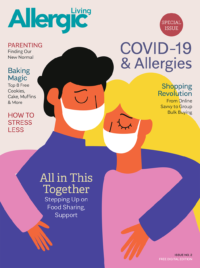Living with food allergies requires planned practices and a regular
schedule to ensure safety, predictability and peace of mind. While covid-19
has changed our world, additional challenges have emerged for the allergy
group.
Those living with food allergies have additional issues during the pandemic,
ranging from fear of using hospitals for allergic reactions to shortages of
allergy friendly foods.
Guidance on reducing stresses and effective measures to ensure well being
and safety with allergies is highlighted.

Taming Food Allergy Stress During COVID-19
By: Dr. Linda Herbert and Dr. Ashley Ramos in Features, Food Allergy, Managing AllergiesPublished: May 19, 2020
The COVID-19 pandemic is a stressful time. Psychologists Dr. Linda Herbert, PhD, and Dr. Ashley Ramos, PhD, help Allergic Living readers with excellent advice to keep both general anxiety and food allergy anxiety in check. This article is excerpted from Allergic Living’s 90-page digital magazine “COVID-19 & Allergies.” Read more great articles in the e-magazine.

Allergy management and emergency preparation can contribute to worry and anxiety during normal times, let alone during a pandemic. COVID-19 has required extensive changes to daily family life and led to uncertainty about the future. It is natural for these changes and uncertainties to impact stress levels about food allergies and asthma, too.
You may be noticing that the allergy-related situations you worry about have changed. In our clinical work, families have expressed anxiety about a number of issues. Concerns include finding allergy-friendly foods due to limited availability, trying out new brands during this time, and the desire to avoid shopping at multiple stores.

Families have been asking about whether to go to the Emergency Department if a family member has symptoms of an allergic reaction or an asthma attack, and raising the issue of teaching alternate caregivers about allergy management.
Interestingly, some families have told us that social distancing measures decreased their anxiety about allergen exposures. During the time of children staying home, they have been feeling more comfortable that they can control what allergens are present.
All of these emotional responses are normal. Following are some strategies that you and your family can try to help you adjust to life during the pandemic.
Food Allergy Tips During COVID-19
Review food allergy plans
Kids may wonder what will happen if they have an allergic reaction, and who will care for them in the event that parents are sick. Review with your kids how you will approach daily food allergy management, as well as emergency situations – should one arise – in the context of COVID-19.
Think ahead on meals
If you experience stress about access to allergy-friendly foods or trying new foods, it may be especially helpful to plan meals for at least one week. This way, you can predict when you will need to go to the grocery store and call ahead to food manufacturers to get product information.
Prepare in case of reaction
If you feel anxious about what will happen if your child has an allergic reaction, having a plan should help to ease those worries. We’d suggest: practicing epinephrine auto-injector administration, packing a ‘to go’ bag in case you do need to go to the Emergency Department, and calling your child’s allergist for recommendations.
If you have been instructed by your allergist to try new foods at home, be thoughtful about the best times to introduce foods, go slow, and have an emergency action plan in place should symptoms arise. If food introductions are bringing on additional stress, ask your allergist whether delaying introduction is feasible until the COVID-19 crisis is resolved.
Focus on building new allergy skills
Identify things that your child can learn while they have additional time at home. For example, if your child is beginning to read, start including them in label reading. If your child is older, it’s a great time to begin showing the basics of cooking allergy-friendly meals!
Educate new caregivers
If you are in a situation where you need alternate childcare, take the time to educate new caregivers about allergy management. Also think proactively about caregivers who may assist in the event that parents get sick.
Seek guidance from your child’s allergist
Your child’s allergist is the best person to advise you if you have questions about your child’s individual risk or when you should treat an allergic reaction/asthma attack at home versus go to the Emergency Department. (See also the Food Allergy Experts, Page 35.) Many allergists are offering telemedicine appointments, so you do not have to attend allergy appointments in person during the COVID-19 crisis.
General Tips For Families
Communicate with kids
Routinely schedule quiet one-on-one time with your child during the pandemic. Use this to check in about how they are feeling and give them time to ask you questions. Validate their feelings and acknowledge that worry is normal.
Focus on what you can control
Make a list of things that you and your child have control over during the stay-at-home lifestyle. This should include establishing a daily routine, maintaining regular sleep and meal schedules, and promoting medication adherence.
Allow your child to participate in developing these plans as much as possible to increase their feelings of control. If social distancing restrictions are easing in your state, discuss the importance of continued hand-washing, avoiding large crowds, and other ways you will keep your child safe. Allow children to pick from a list of permitted activities to promote their feelings of control.
Connect with social support networks
Find virtual ways for parents and children to connect with friends and extended family. Consider one-on-one or small group video calls to increase feelings of connection with peers.
Engage in calming activities
These are important, so try to take time each day for at least one calming activity. These will be different for each person, but ideas include journaling, art, exercise, reading and outdoor time.
Kids and the news
Set age-appropriate limits and be judicious about how much access to the news your child has. Stories about allergic reactions can be inappropriate for children because they heighten anxiety. Similarly, it may also be inappropriate to allow your child to hear stories about the difficulty of finding allergy-friendly foods or hear about the risk of being exposed to COVID-19 in the Emergency Department. Be aware of little ears.
Use Anxiety Management Strategies
To reduce and prevent feelings of worry and stress, it’s best to try to practice such strategies every day. Here are some examples that parents and children can use:
Deep Breathing
Close your eyes and imagine a balloon in your belly. Breathe in through your nose and imagine the balloon inflating as your belly rises. Exhale through your mouth and imagine the balloon deflating. Repeat 3-5 times.
Schedule Worry Time
Set aside 10-20 minutes during the day to acknowledge your worry. Use drawing, writing, or communicating to express your worries during worry time. If a concern pops in your head outside of worry time, imagine filing it away in your brain until scheduled worry time comes around.
Meditation
Consider use of meditation apps to practice guided meditation. Examples include Calm, Headspace, and Stop, Breathe & Think Kids.
Identify Positive Thoughts
Take time to reflect on things that you and your child have enjoyed about the recent changes. For example, spending time with family, nightly family dinners, wearing pajamas later in the day, or getting to spend more time outside. Write these positive thoughts down and hang them somewhere where your family can be reminded of these things.

This article is excerpted from Allergic Living’s 90-page digital magazine “COVID-19 & Allergies.” Read more great articles in the e-magazine.
Linda Herbert, PhD, is a pediatric psychologist and director of the psychosocial clinical program in the Division of Allergy and Immunology at Children’s National Hospital in Washington, DC.
Ashley Ramos, PhD, is a pediatric psychologist in the same program, providing clinical care and participating in clinical research.
This article is meant as general guidance and is not to be interpreted as diagnosis and treatment of patient conditions. For specific advice, contact a psychologist or allergist.
Related Resources
13 Kitchen Pantry Hacks: See digital magazine, Page 9
National Child Traumatic Stress Network’s Guide to COVID-19
Children’s National Hospital’s Rise and Shine blogs about COVID-19


Leave A Comment